Oscars 2016: Bryan Cranston’s love of a good debate made him right for ‘Trumbo’
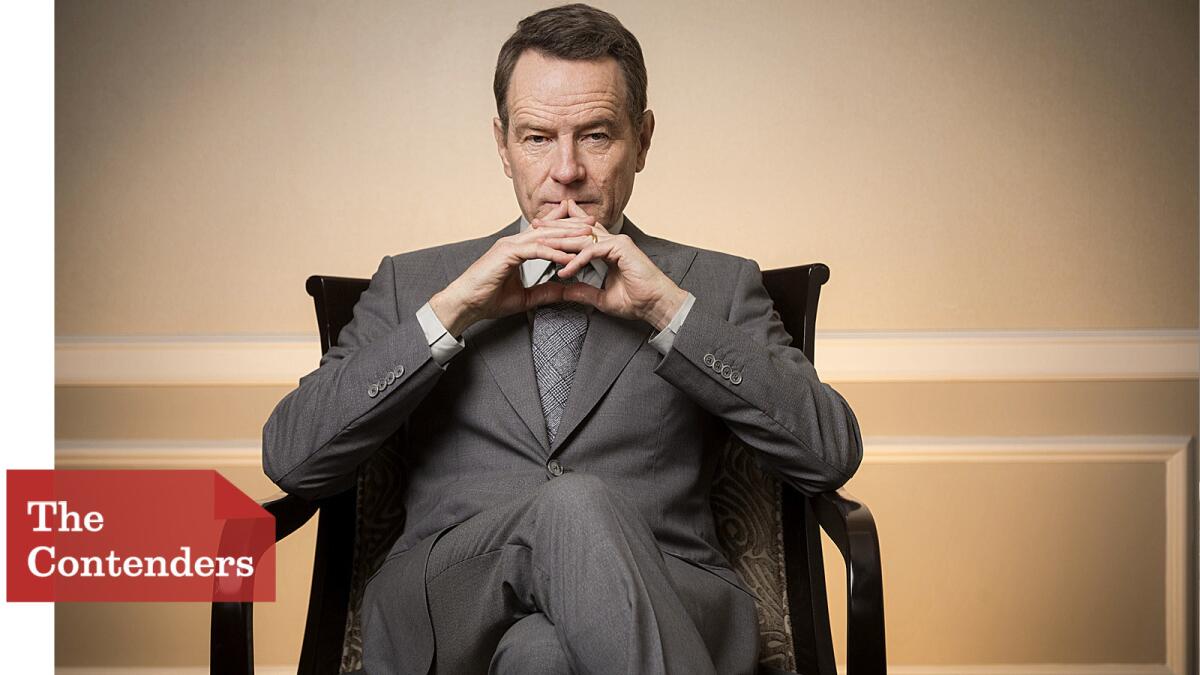
Bryan Cranston earned his first Academy Award nomination for his performance as the titular blacklisted screenwriter of “Trumbo.”
- Share via
Bryan Cranston is waiting for an elevator the morning after the Golden Globes when a woman in her early 30s approaches him holding up her iPhone.
“My husband would kill me if I didn’t get a picture with you,” she tells him. Cranston considers the woman’s request. “He would kill you?” he says, repeating her choice of words. “If you don’t mind me saying so, that concerns me.” Cranston obliges, as he does so often these days, his face immediately recognizable from his five-year stint playing Walter White, the high school chemistry teacher who becomes a drug lord (and relishes that decision) on “Breaking Bad.”

The familiarity that people feel toward him these days has resulted in Cranston’s having some hard-and-fast rules about navigating his public life. At the Globes, where he was up for lead actor in a drama for his turn as blacklisted screenwriter Dalton Trumbo in “Trumbo,” Cranston knew he had to leave the parties around 10:30 p.m. “That’s the dividing line between people asking for a picture or autograph politely and them throwing their arms around you and talking too close,” he says, adding that he returned to his Sherman Oaks home and was in bed with his wife of 26 years, Robin Dearden, shortly after midnight.
SIGN UP for the free Gold Standard newsletter >>
He also extends rules from the smallest of things, like the proper way to load a dishwasher, to a deep belief that change is inevitable and the only thing you can do is have the courage to embrace the moment.
“Somebody asked me the other day how I felt now that I’m about to turn 60,” Cranston says, “the implication being, ‘Is it sobering to be inching closer to the grave?’ And my answer is, ‘Yes, it is. So don’t waste any time.’”
“He definitely has strong opinions on just about everything,” says Jay Roach, who directed Cranston in “Trumbo” and HBO’s “All the Way,” the upcoming adaptation of the Broadway play that features Cranston playing Lyndon Johnson. “But there’s zero ego with him. He just likes to mix it up. He loves a good debate.”
Which made Cranston a nice fit for “Trumbo,” which follows the chain-smoking, prolific writer of such classic movies as “Spartacus” and “Roman Holiday,” beginning with his confrontational appearance before the House Un-American Activities Committee in 1947, which landed him first in prison for contempt of Congress and then on the Hollywood blacklist. Trumbo’s story, for Cranston, is about what happens when a government overreaches and, instead of ridding society of evil, creates an infamy of its own.
The film’s examination of the ways politicians play on people’s fears of the Other has obvious modern parallels, which has made the Q&A sessions following “Trumbo’s” screenings particularly lively this awards season. Donald Trump’s name has come up more than once. Cranston says he believes Trumbo would have respected the Republican presidential front-runner’s blunt nature and his refusal to be beholden to special interests.
Oscars 2016: Full Coverage | Complete list | Snubs, surprises and reactions | Top nominee photos | Oscars are so white, again
“He’s speaking what he believes, and that’s to be commended,” Cranston says. “However, the fear-mongering he engages in doesn’t offer any solutions. Look at what he said about terrorists: ‘When we find known terrorists, we’ve got to go find their families and kill them. We’ve got to take them out.’” Cranston pauses, marveling. “With Trump, every type of hyperbolic, incendiary comment he makes is both refreshing in the sense of ‘Oh, my God, I can’t believe he said that’ and horrifying on the other end because, ‘Oh, my God, I can’t believe he just said that.’”
Cranston happily relates dissenting opinions offered at “Trumbo” events, affairs typically geared more toward promotion than discussion. When audience members grab the microphone and take issue with the movie, Cranston tells them, “You know what? You’re right.”
Watch Q&As with the ‘Trumbo’ cast and crew

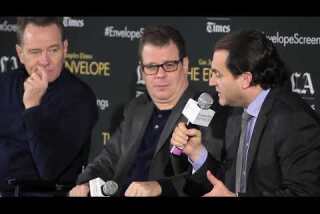
'Trumbo:' Dissecting Edward G. Robinson
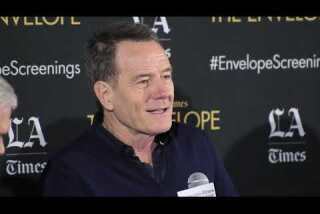
'Trumbo': Looking back at Dalton Trumbo's life and work
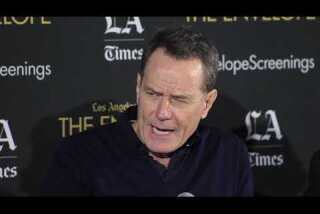
'Trumbo:' Measuring patriotism and talking civil rights
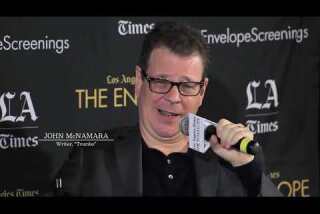
'Trumbo:' The blacklist and Hollywood
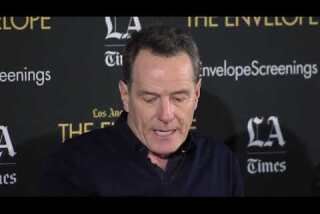
'Trumbo:' Navigating the media landscape, past and present
“And people are, ‘Wait. What do you mean she’s right?’ Because that’s how she felt,” Cranston says. “I can’t impose what we were trying to convey upon you. You either feel it or you don’t. That’s what’s so great about art. There’s no right or wrong.”
Says Roach: “I’ve met very few people, especially in our business, who are as comfortable in their own skin as Bryan is. I think his calm, ego-less confidence enables him to be nonjudgmental and un-offendable in almost every situation.” He adds that one of Cranston’s favorite lines in the film comes when Trumbo tells frequent adversary John Wayne: “We both have the right to be wrong.”
Talking with the actor on several occasions through the years, the words he most frequently uses are “lucky,” “fortunate” and “grateful.” Cranston was 40 when he was cast as the bumbling dad in the sitcom “Malcolm in the Middle” and just past 50 when he landed “Breaking Bad.” Now, nearing 60, fresh off the Oscar nomination for “Trumbo” and a Tony win for “All the Way,” Cranston sums up his career in one word — “fine.”
“I started working exclusively as an actor when I was 25 years old, and I had a good life,” Cranston says. “I was a journeyman actor, working here and there. And I loved it. So had that not changed for me, I’d still be fine because I love what I’m doing. I didn’t have any projection or a need to hit some kind of plateau or end result in order to be happy. Obviously, the success enhances it. But it didn’t make it.”
More to Read
Sign up for The Envelope
Get exclusive awards season news, in-depth interviews and columnist Glenn Whipp’s must-read analysis straight to your inbox.
You may occasionally receive promotional content from the Los Angeles Times.











